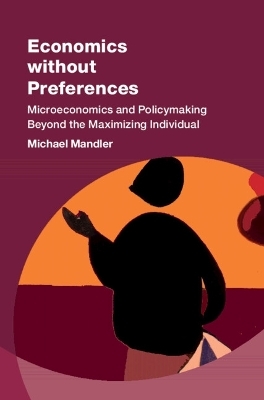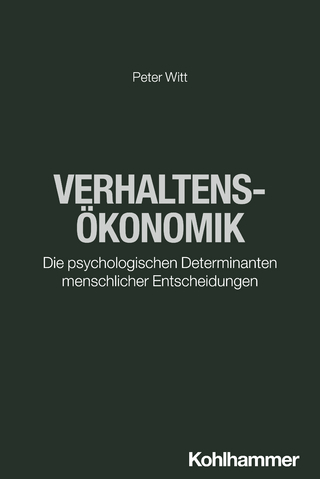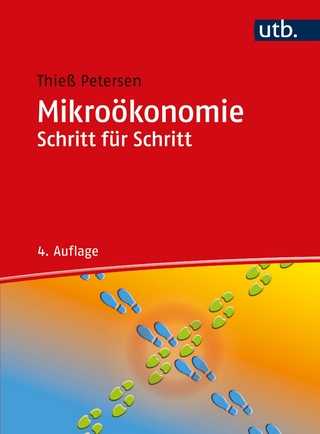
Economics without Preferences
Microeconomics and Policymaking Beyond the Maximizing Individual
Seiten
2025
Cambridge University Press (Verlag)
978-1-009-34070-0 (ISBN)
Cambridge University Press (Verlag)
978-1-009-34070-0 (ISBN)
- Noch nicht erschienen (ca. März 2025)
- Versandkostenfrei
- Auch auf Rechnung
- Artikel merken
A new microeconomics when agents lack the preferences that economics normally relies on. Parts of economic orthodoxy go out the window: prices can be volatile, cost-benefit analysis no longer supplies easy answers. This book offers policy alternatives that deliver the productivity growth that capitalism can potentially provide.
Economics without Preferences lays out a new microeconomics - a theory of choice behavior, markets, and welfare - for agents who lack the preferences and marginal judgments that economics normally relies on. Agents without preferences defy the rules of the traditional model of rational choice but they can still systematically pursue their interests. The theory that results resolves several puzzles in economics. Status quo bias and other anomalies of behavioral economics shield agents from harm; they are expressions rather than violations of rationality. Parts of economic orthodoxy go out the window. Agents will fail to make the fine-grained trade-offs ingrained in conventional economics, leading market prices to be volatile and cost-benefit analysis to break down. This book provides policy alternatives to fill this void. Governments can spur innovation, the main benefit markets can deliver, while sheltering agents from the upheavals that accompany economic change.
Economics without Preferences lays out a new microeconomics - a theory of choice behavior, markets, and welfare - for agents who lack the preferences and marginal judgments that economics normally relies on. Agents without preferences defy the rules of the traditional model of rational choice but they can still systematically pursue their interests. The theory that results resolves several puzzles in economics. Status quo bias and other anomalies of behavioral economics shield agents from harm; they are expressions rather than violations of rationality. Parts of economic orthodoxy go out the window. Agents will fail to make the fine-grained trade-offs ingrained in conventional economics, leading market prices to be volatile and cost-benefit analysis to break down. This book provides policy alternatives to fill this void. Governments can spur innovation, the main benefit markets can deliver, while sheltering agents from the upheavals that accompany economic change.
Michael Mandler is a Professor of Economics at Royal Holloway College, University of London. He is an economic theorist who has taught at the University of Pennsylvania and Harvard University and is the author of Dilemmas in Economic Theory (1999).
Preface; 1. Marginal utility matters; Part I. Trade-Offs and Rationality: 2. Utility as an ordering principle; 3. Incomplete preferences; 4. The rationality of choice; 5. Safety bias; 6. The myth of indifference; part II. Economic Analysis and Policy Without Preferences: 7. The volatility of prices; 8. Trouble with welfare economics; 9. Pareto without preferences; 10. Utilitarianism without utility; 11. Production and rationality; 12. Custom and flexibility; Appendix.
| Erscheint lt. Verlag | 31.3.2025 |
|---|---|
| Reihe/Serie | Studies in New Economic Thinking |
| Zusatzinfo | Worked examples or Exercises |
| Verlagsort | Cambridge |
| Sprache | englisch |
| Themenwelt | Wirtschaft ► Allgemeines / Lexika |
| Wirtschaft ► Volkswirtschaftslehre ► Mikroökonomie | |
| Wirtschaft ► Volkswirtschaftslehre ► Wirtschaftspolitik | |
| ISBN-10 | 1-009-34070-0 / 1009340700 |
| ISBN-13 | 978-1-009-34070-0 / 9781009340700 |
| Zustand | Neuware |
| Informationen gemäß Produktsicherheitsverordnung (GPSR) | |
| Haben Sie eine Frage zum Produkt? |
Mehr entdecken
aus dem Bereich
aus dem Bereich
Wirtschaftszusammenhänge verstehen und mitreden können
Buch | Softcover (2023)
Wiley-VCH (Verlag)
CHF 27,95
die psychologischen Determinanten menschlicher Entscheidungen
Buch | Softcover (2024)
Kohlhammer (Verlag)
CHF 54,60


